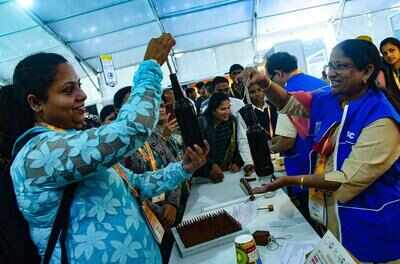Top Searches
- News
- City News
- nagpur News
- Make India most advanced lab of modern science in 75th year of independence: Modi
Make India most advanced lab of modern science in 75th year of independence: Modi

Nagpur: Prime Minister Narendra Modi on Tuesday exhorted the scientific community to make India the most advanced laboratory of modern science in its 75th year of independence.
Addressing the delegates of the 108th Indian Science Congress virtually, the PM expressed belief that a clear roadmap for the future will be prepared on various constructive points during the five-day event hosted by Nagpur University.
Pointing out the role of India’s scientific strength in India’s story of development over the next 25 years, Modi said when the spirit of national service was infused in science along with passion, results would be unprecedented. “I am sure, India’s scientific community will ensure a place for our country, of which it was always deserving.”
Highlighting the importance of gathering data and analyzing results, Modi spoke about abundant availability of data and technology in 21st century India. “Data has the potential to take Indian science to new heights. The field of data analysis is moving forward at a meteoric pace, which is of big help in converting information into insight and analysis into actionable knowledge. Be it traditional knowledge or modern technology, each one plays a crucial role in scientific discovery.”
Explaining India’s tryst with the scientific approach, the PM said that it was fast making its way into world’s top ranked nations in the field of science. “In 2015, India was ranked 81 among 130 countries in the Global Innovation Index. In 2022, it has jumped to 40th position. We are among the top three nations in the world in terms of the number of PhDs and startup ecosystems.”
Hailing the ISC theme — Science and Technology for Sustainable Development with Women Empowerment – he said the thinking is not just that we should empower women but also empowering science by their contribution.
“The Mudra Yojna has been instrumental in empowering women. Doubling of women’s participation in the field of extramural research and development is proof that they and science are both progressing in the nation. India has been bestowed on the opportunity to preside over G-20 and the women-led development is one of the high-priority subjects.”
Challenging the scientific community to turn knowledge into actionable and helpful products, the PM said efforts of science can turn into big achievements only when they come out of the lab and reach the land, and their impact reaches from grassroots to the globe. “The changes should be visible from research to real life. When science’s achievements complete the distance between experiments to people’s experiences, it gives an important message and impresses the young generation, who get convinced of the role of science.”
Quoting examples of Talent Hunt and Hackathons, through which children with scientific temper could be discovered, Modi spoke about India’s strides in the field of sports and attributed the success to the emerging robust institutional mechanism and guru-shishya parampara. He suggested that this tradition can be the mantra of success in the field of science.
Science in India should make the country atma nirbhar (self-reliant). About 17-18% of the human population resides in India and such scientific developments should benefit them. To address the growing energy needs of the country, India is working on a ‘National Hydrogen Mission’. “We need to manufacture critical equipment like electrolysers in India to make it a success.”
Warning that new diseases (Covid-19) are throwing up new challenges before humans, Modi called on the scientific community to develop ways of dealing with emerging diseases and encouraging research in developing new vaccines. “Like the technology to tackle natural calamities like floods and earthquakes, we need to have integrated disease surveillance to identify those and find ways to eliminate them. Various ministries need to work together in the field of science and technology.”
Acknowledging the role of low-cost satellite launch vehicles in the booming space sector of India, the PM mentioned that the world will come forward to utilise India's services. “There will be opportunities for private companies and startups by associating with research and development laboratories and academic institutions. India is making its mark in the world as a quantum frontier and quantum computing. It is also moving fast in the direction of quantum computers, chemistry, communication, sensors, cryptography and new materials,” he said while urging young researchers and scientists to gain expertise in the quantum field and become leaders.
Stressing on the need to focus on futuristic ideas and areas where no work is happening anywhere. Modi called on the delegates to work in AI (artificial intelligence), AR (augmented reality), and VR (virtual reality). “The scientific community should come up with innovations in semiconductor chips and think about keeping its future ready from now on. If the country takes initiative in these areas, we will be in a position to lead the industry,” he said.
Addressing the delegates of the 108th Indian Science Congress virtually, the PM expressed belief that a clear roadmap for the future will be prepared on various constructive points during the five-day event hosted by Nagpur University.
Pointing out the role of India’s scientific strength in India’s story of development over the next 25 years, Modi said when the spirit of national service was infused in science along with passion, results would be unprecedented. “I am sure, India’s scientific community will ensure a place for our country, of which it was always deserving.”
Highlighting the importance of gathering data and analyzing results, Modi spoke about abundant availability of data and technology in 21st century India. “Data has the potential to take Indian science to new heights. The field of data analysis is moving forward at a meteoric pace, which is of big help in converting information into insight and analysis into actionable knowledge. Be it traditional knowledge or modern technology, each one plays a crucial role in scientific discovery.”
Explaining India’s tryst with the scientific approach, the PM said that it was fast making its way into world’s top ranked nations in the field of science. “In 2015, India was ranked 81 among 130 countries in the Global Innovation Index. In 2022, it has jumped to 40th position. We are among the top three nations in the world in terms of the number of PhDs and startup ecosystems.”
Hailing the ISC theme — Science and Technology for Sustainable Development with Women Empowerment – he said the thinking is not just that we should empower women but also empowering science by their contribution.
“The Mudra Yojna has been instrumental in empowering women. Doubling of women’s participation in the field of extramural research and development is proof that they and science are both progressing in the nation. India has been bestowed on the opportunity to preside over G-20 and the women-led development is one of the high-priority subjects.”
Challenging the scientific community to turn knowledge into actionable and helpful products, the PM said efforts of science can turn into big achievements only when they come out of the lab and reach the land, and their impact reaches from grassroots to the globe. “The changes should be visible from research to real life. When science’s achievements complete the distance between experiments to people’s experiences, it gives an important message and impresses the young generation, who get convinced of the role of science.”
Quoting examples of Talent Hunt and Hackathons, through which children with scientific temper could be discovered, Modi spoke about India’s strides in the field of sports and attributed the success to the emerging robust institutional mechanism and guru-shishya parampara. He suggested that this tradition can be the mantra of success in the field of science.
Science in India should make the country atma nirbhar (self-reliant). About 17-18% of the human population resides in India and such scientific developments should benefit them. To address the growing energy needs of the country, India is working on a ‘National Hydrogen Mission’. “We need to manufacture critical equipment like electrolysers in India to make it a success.”
Warning that new diseases (Covid-19) are throwing up new challenges before humans, Modi called on the scientific community to develop ways of dealing with emerging diseases and encouraging research in developing new vaccines. “Like the technology to tackle natural calamities like floods and earthquakes, we need to have integrated disease surveillance to identify those and find ways to eliminate them. Various ministries need to work together in the field of science and technology.”
Acknowledging the role of low-cost satellite launch vehicles in the booming space sector of India, the PM mentioned that the world will come forward to utilise India's services. “There will be opportunities for private companies and startups by associating with research and development laboratories and academic institutions. India is making its mark in the world as a quantum frontier and quantum computing. It is also moving fast in the direction of quantum computers, chemistry, communication, sensors, cryptography and new materials,” he said while urging young researchers and scientists to gain expertise in the quantum field and become leaders.
Stressing on the need to focus on futuristic ideas and areas where no work is happening anywhere. Modi called on the delegates to work in AI (artificial intelligence), AR (augmented reality), and VR (virtual reality). “The scientific community should come up with innovations in semiconductor chips and think about keeping its future ready from now on. If the country takes initiative in these areas, we will be in a position to lead the industry,” he said.
Start a Conversation
FOLLOW US ON SOCIAL MEDIA
FacebookTwitterInstagramKOO APPYOUTUBE









